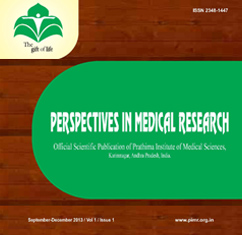
Original Articles
Year : 2016 | Volume : 4 | Issue : 2 Page : 6 - 9
Prashanth Kumar M
Associate Professor, Department of Pathology, Prathima Institute of Medical Sciences,Karimnagar,Telangana.
Address for correspondence: Dr. Prashanth Kumar M, Associate Professor, Department of Pathology, Prathima Institute of Medical Sciences,Karimnagar,Telanagana,India.
Email: [email protected]
Introduction: Skin, the largest external organ of human body, is associated with a gamut of lesions. Clinical manifestations include erythema, itching, edema, swelling, vesicles, bullae, alterations in pigmentation etc. Mast cell is an integral cellular component of skin and is believed to respond to diverse range of stimuli. Mast cells can regulate tissue changes that confer either a beneficial or a harmful effect depending upon specific circumstances. In the present study, an attempt is made to evaluate mast cell profile (density) in various non neoplastic skin lesions. No attempt is made to assess their role in different cutaneous disorders.
Material and Methods:A prospective analytical histopathological study of non-neoplastic skin lesions was carried out during June 2004 –May 2005. A total of seventy two cases were included in this study.
Results: Irrespective of category, lesions of bullous mastocytosis showed highest mast cell density and the lowest numbers were seen in scleroderma
Conclusion: Majority of inflammatory lesions, infective and non-infective, showed definite changes in mast cell numbers and distribution patterns (like perivascular and interstitial) when compared to normal skin controls. Lesions with epidermal involvement showed increased number of mast cells in superficial dermis and lesions with dermal involvement showed dermal predominance of mast cells.
Keywords :Mast cells, non neoplastic skin lesions, lichen planus, psoriasis

Open Access
Perspectives in Medical Research is committed to keeping research articles Open Access.Journal permits any users to read, download, copy, print, search, or link to the full texts of these articles...
Read more
